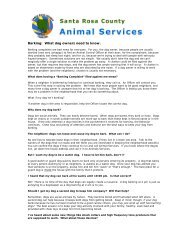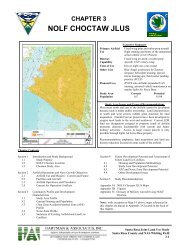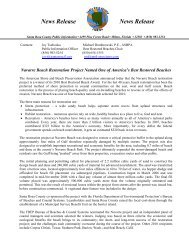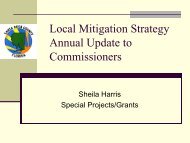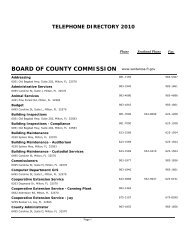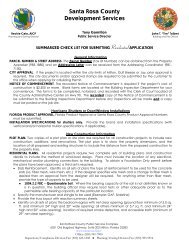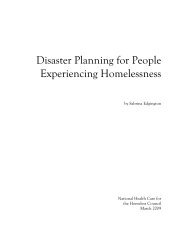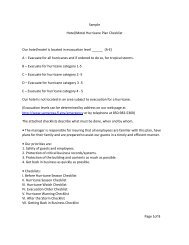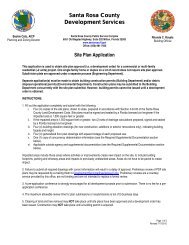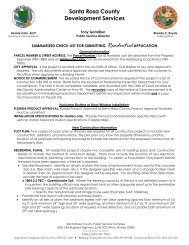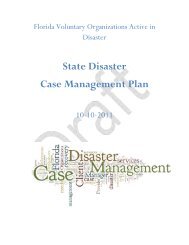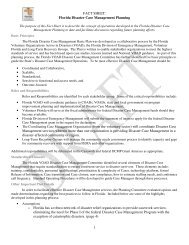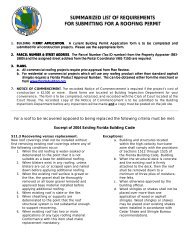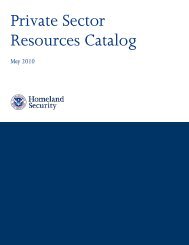Disaster - Santa Rosa County
Disaster - Santa Rosa County
Disaster - Santa Rosa County
You also want an ePaper? Increase the reach of your titles
YUMPU automatically turns print PDFs into web optimized ePapers that Google loves.
Simple Tool can Save Your Life<br />
One of the wisest and least expensive things you can do to protect your<br />
family is to purchase a NOAA Weather Radio. NOAA Weather Radios<br />
are equipped with a special alarm tone feature, and can sound an alert<br />
and give you immediate information about a life-threatening situation.<br />
During an emergency, National Weather Service forecasters can interrupt<br />
routine weather radio programming and insert special warning messages<br />
concerning imminent threats to life or property. When the weather radio<br />
is activated, a loud alarm sounds to catch your attention. It may make the<br />
difference between life and death as the alarm will sound 24 hours a day,<br />
even when you are sleeping or when you are not tuned in to commercial<br />
radio or TV to receive EAS notices.<br />
6<br />
Planning<br />
Warnings for Deaf or Hard of Hearing<br />
People who are deaf, hard of hearing, or visually impaired can be alerted<br />
to severe weather and other hazards by special devices connected to<br />
the NOAA Weather Radio receiver. These attention-getting devices<br />
may include strobe lights, bed shakers and even sirens. Some weather<br />
radios also provide a limited caution-like front message display<br />
which gives basic information regarding the nature of the event or<br />
emergency. Once activated, the user should go to their normal source<br />
of news and/or information for further details. For more information<br />
visit www.nws.noaa.gov/nwr/special_need.htm.<br />
In conjunction with federal, state, local emergency managers and other public<br />
officials, NWR also broadcasts warnings for all types of hazards including natural,<br />
chemical releases or oil spills, AMBER and Silver alerts, or 911 telephone<br />
outages.<br />
Same & Radio Frequencies<br />
Some weather radios are equipped with Specific<br />
Area Message Encoding, or SAME, which when<br />
properly programmed will only issue alerts that<br />
directly impact the specified SAME area, cutting<br />
down on unnecessary alarms.<br />
The primary SAME numbers and NOAA<br />
Weather Radio frequencies for<br />
<strong>Santa</strong> <strong>Rosa</strong> <strong>County</strong> are:<br />
Insect Safety<br />
SAME # 012113 Frequency 162.400<br />
SAME # 012113 Frequency 162.475<br />
SAME # 012113 Frequency 162.550<br />
With the mild winter season and outdoor activities starting to ramp<br />
up, you should always be alert for insects. Insects such as ticks and<br />
mosquitoes are known to carry diseases. To protect yourself and<br />
others, follow these tips or visit www.santarosa.fl.gov/mosquito/<br />
index.cfm for more information.<br />
• Wear a light-colored long-sleeved shirt, long pants, and a hat.<br />
• Secure your clothes with rubber bands or tape to prevent insects from getting underneath them.<br />
• Avoid underbrush and tall grass when hiking.<br />
• Use an insect repellent and follow the directions for use. Be sure to read cautionary statements on label.<br />
• After being outdoors for a long period, inspect yourself for ticks or have someone else do it. Shower<br />
immediately after coming indoors.<br />
• If you find a tick, remove it by pulling steadily and firmly. Grasp the tick with a fine-tipped tweezers, as<br />
close to the skin as possible, and pull slowly. Wash area and apply antiseptic or antibiotic ointment.<br />
Watch area for infection. See a physician if you see signs of a rash in that area.<br />
• If you have pets that go outdoors, use a repellent made for that type of pet and apply according to the<br />
label. Be sure to check your pet for ticks often.<br />
• If you are stung, use a credit card to sweep away the stinger.<br />
• A yellow jacket may have been rooting around in your garbage can before stinging you; properly treat the<br />
sting, even if it doesn’t hurt, as a secondary infection may develop.



